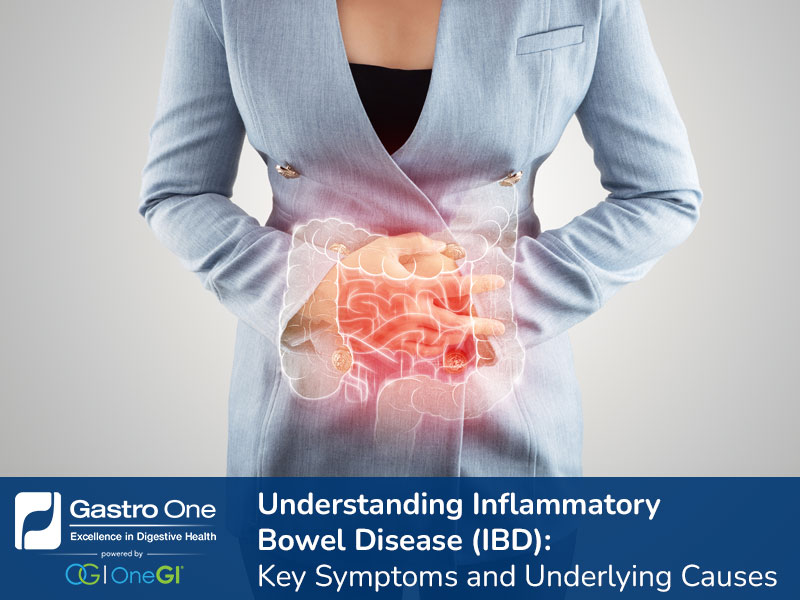
Inflammatory Bowel Disease (IBD) affects millions of people worldwide, with an estimated 7 million cases globally and over 2 million in the United States alone. The exact cause of inflammatory bowel disease is not fully understood, but it plays a major role in how the condition begins and progresses.
If you’ve experienced persistent gastrointestinal discomfort, you’re not alone. Studies show that IBD is most commonly diagnosed in individuals between the ages of 15 and 35, and its prevalence is increasing annually. This blog provides clear information about IBD, its symptoms, causes, and management options. By understanding it better, you can make informed decisions about your health.
What Is IBD?
IBD is a term used to describe disorders that cause inflammation in the digestive tract. The two main types are:
- Crohn’s Disease
- Can affect any part of the digestive tract, commonly the small intestine and colon.
- Involves inflammation that extends through multiple layers of the digestive tract tissue.
- Ulcerative Colitis
- Limited to the colon and rectum.
- Affects only the innermost lining.
Common Symptoms of IBD
Symptoms can be mild or severe. They may occur in episodes, followed by periods of remission. Key symptoms include:
- Diarrhea
- Abdominal Pain and Cramping
- Blood in Stool
- Loss of Appetite
- Unintentional Weight Loss
- Fatigue
When symptoms persist or worsen, consult with a gastroenterologist. Timely intervention can prevent complications.
What Causes IBD?
The exact cause of inflammatory bowel disease is unclear, but genetic factors, immune system responses, and environmental influences like diet, stress, and gut health are thought to play a role. Smoking and certain medications may also increase the risk for some individuals.
Immune System
A malfunctioning immune system may mistakenly attack the digestive tract during an infection, leading to chronic inflammation. This occurs when the immune system fails to distinguish between harmful pathogens and the body’s own tissues, triggering an ongoing inflammatory response.
Genetics
Family history increases risk. If a parent or sibling has IBD, you may be predisposed. However, not everyone with a genetic link develops IBD.
Environmental Triggers
Lifestyle and environmental conditions may contribute.
Diet, stress levels, and exposure to pollutants are thought to play a role in the onset or worsening of symptoms.
- Exposure to antibiotics in childhood.
- A sterile environment with limited exposure to germs.
Understanding these factors doesn’t guarantee prevention but helps in managing risks.
Potential Complications
If left untreated, inflammatory bowel disease (IBD) can cause serious complications and increase the risk of additional health issues, such as:
- Colon cancer.
- Nutritional deficiencies, including anemia.
- Bowel obstructions or perforations.
- Severe dehydration due to frequent diarrhea.
Be aware of emergency symptoms like severe abdominal pain and rectal bleeding. These require immediate medical attention.
Managing and Treating IBD
While there’s no cure for IBD, inflammatory bowel disease treatment focuses on reducing inflammation and alleviating symptoms to help manage the condition. It’s important to note that the underlying cause of inflammatory bowel disease is not fully understood and may involve a complex interaction of genetics, immune response, and environmental factors. Options in treatment include:
- Medication
- Anti-inflammatory drugs.
- Immune system suppressors.
- Dietary Adjustments
- Avoid triggers like caffeine and alcohol.
- High-fiber or low-residue diets depending on symptoms.
- Surgery
- Reserved for severe cases to remove affected portions of the digestive tract.
Consistency is key. Regular follow-ups and open communication with your healthcare team can lead to better outcomes and identify adjustments needed in your treatment plan.
Work with a healthcare professional or a gastroenterologist to tailor a treatment program to your needs. Lifestyle choices, including stress management techniques, a balanced diet, and quitting smoking, can further complement your medical treatment and improve overall well-being. Adopting these practices can help minimize the occurrence of flare-ups and maintain a healthier lifestyle.
Take the First Step Toward Better Health
If you’re experiencing gastrointestinal symptoms that align with IBD, don’t delay action. These symptoms can include persistent diarrhea, bloody stools, severe abdominal pain, fatigue, or unexplained weight loss. By seeking medical advice promptly, you can ensure a faster diagnosis and begin implementing a personalized management plan.
Schedule an appointment today to explore tailored care options and start managing your symptoms effectively. Remember, early intervention can make a significant difference in your quality of life, helping you regain control, reduce symptoms, and focus on the activities you enjoy most.



